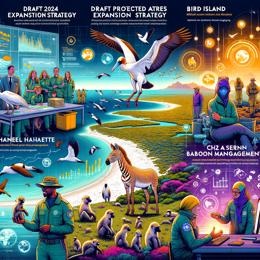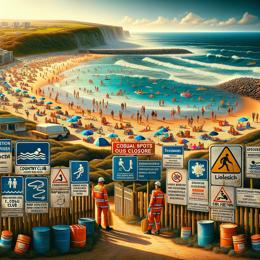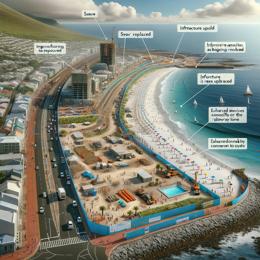Image created by AI
SPCA Study Reveals Fireworks Disturb Marine Wildlife, Urges Ban Near Sensitive Coastal Areas
The Cape of Good Hope Society for the Prevention of Cruelty to Animals (SPCA) has pioneered a notable study that examines the effects of fireworks displays on marine wildlife in South Africa. Instigated by the SPCA's concern for the environment and its inhabitants, the study's purpose was to substantiate claims about the detrimental consequences fireworks have on coastal fauna.
This research initiative emerged following the Cape High Court's rejection of the SPCA's legal bid to halt a planned New Year's Eve fireworks show at the V&A Waterfront for December 31, 2023. Presided over by Judge LG Nuku, the court's decision pointed to a lack of sufficient evidence from the SPCA, which they found relied heavily on anecdotal accounts. Despite the dismissal, the organization received a cost-saving deferment under section 32 (2) of the National Environmental Management Act (NEMA), recognizing their court pursuit as a measure of last resort borne out of environmental concerns.
Conducted by Sea Search, the study explored the responses of Hartlaub's gulls and Cape fur seals to a fireworks spectacle, monitoring changes in their natural behaviours. According to the findings, both species exhibited significant disturbances, such as escalated vocalization and a shift from resting to alert and locomotive behaviours—classic indicators of stress in animals. The fireworks caused immediate, observable changes, inciting anticipatory anxiety and increased stress levels—changes that could potentially lead to detrimental, long-term effects on the health and reproductive success of endangered species.
The V&A Waterfront's proximity to critical habitats, including the breeding grounds on Robben Island, accentuates the importance of these findings. The National Environmental Management Biodiversity Act 10 of 2004 explicitly prohibits harassing animals on the protected list. However, due to the immediate reaction observed in marine life, the study argues that fireworks, by their very nature, qualify as harassment.
As a response to these significant findings, the SPCA and Sea Search advocate for a prohibition on fireworks in coastal regions, particularly where sensitive or endangered species are found. The recommendation is underpinned by the study’s conclusive evidence of the detrimental impact of fireworks on the behavior and well-being of marine wildlife. The proposed ban would encompass breeding colonies, roosting sites, and other vulnerable areas, aiming to mitigate the harm caused by these flashy events on the already stressed populations of marine species.
The study by the Cape of Good Hope SPCA sheds light on an overlooked environmental issue, strengthening the argument against the use of fireworks in ecologically sensitive areas. By providing robust, scientific evidence, the organization seeks to protect marine wildlife from unnecessary disturbances and to maintain the integrity of South Africa’s diverse coastal ecosystems. It is now upon policymakers and the community at large to heed these recommendations and act towards the conservation of the nation’s marine biodiversity.










